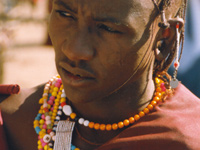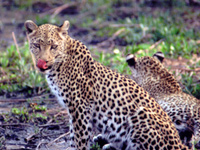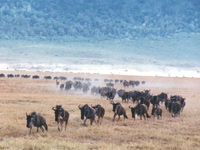
How One Safari Operator Is Keeping Africa Just the Way It Is
by Jessica Howell
For the first “green” issue of ROAD & TRAVEL, we wanted to dig up dirt on the best of eco-friendly travel – and not all of the same stuff that you’ve already heard. All you’ve got to do is type a few keywords into Google and – poof! – plenty of earth conscious lodgings, programs and organizations will appear.
What we wanted to know was: what does it really take to operate in the “green” travel world? What fuels those eco-minds behind the curtains and what kind of differences are made from the eyes that see world travel up close and personal?
 |
African Maasai Warrior on Safari Tour |
To answer our questions, we found Kent Redding, President of Africa Adventures Consultants, a green safari tour operator. Redding and his team offer a healthy batch of safari tours throughout Africa’s vast continent. From luxe safaris to family adventures and experienced traveler trips, Africa Adventure Consultants bring dreamers like us face-to-face with unparalleled wildlife, rich cultures and stunning scenery, all at the hands of guides who’ve lived and worked in Africa for years.
Below, Redding dishes on some of the ups and downs, and ins and outs of operating as a green travel guide in a country like Africa.
Q: What are Africa’s current primary environmental issues?
KR: Wow, this could fill volumes. In my opinion, the primary issues are population growth, poverty and corruption. Each of these either directly negatively impacts the environment or contributes to problems associated with providing sustainable tourism. Most African countries I am familiar with (East and Southern Africa) are experiencing large and steady increases in population despite the AIDS epidemic. Because the majority of people are extremely poor and poorly educated, there are very limited options for feeding the family—therefore many Africans still practice substance farming to survive and a much smaller number turn to poaching.
Every year, we’re seeing more people try to cultivate more land, much of which is not really suitable for agriculture. Poor agricultural practices can often strain delicate ecosystems or create new problems—for instance when pesticides are overused or when land is overused and then deteriorates. We’re also seeing more people push into park lands and other areas which were formerly wild, eliminating or harming natural ecosystems. This strains the environment and causes conflict between wildlife and people. And, we’re seeing continued game poaching—much of which is to feed, or provide for, families. Keep in mind that many of these countries rank amongst the poorest on earth, so both individuals and governments have extremely limited resources. Government corruption compounds this problem because land is not always distributed fairly, funding is not allocated because it’s been pilfered, money is siphoned from aid projects, and more.
Q: How does safari travel impact those issues?
KR: It impacts issues in both positive and negative ways. I believe that the greatest impact is positive. Tourism is generally one of the top 1-3 foreign income earners for many of these countries, which provides much needed cash for the governments and economies of these very poor nations. Tourism creates employment and opportunities for training and advancement for people. For instance, a safari guide in Tanzania is a very desirable job, earning well above the national average salary. A person with modest formal education, but good bush, language and people skills can earn a very good living relative to the rest of the population.
Tourism is the primary, if not sole, source for funding for many national parks, which the local governments could not afford to keep, administer or protect without these dollars. So, in effect, tourists are the ones who are keeping Africa wild and protecting habitat, wildlife and biodiversity.
 |
Leopard Spotting on Africa Adventure |
On the negative side, most tourism in Africa is a very fuel intensive activity—from safari vehicles, to supply trucks to generators at camps. Foreign tourists create a large amount of trash, for which there are not great methods of storage/destruction available. In some areas, tourist facilities take an unfair and disproportionate share of limited resources like water.
Q: How does your company specifically minimize impact?
KR: Africa Adventure Consultants is one of a small but growing number of companies who attempt to minimize negative environmental impacts and create opportunities for learning and creation of more positive approaches to tourism. We do this by educating consumers about impacts and options; utilizing environmentally friendly ground operators, camps, and guides whenever possible; promoting camps which use solar lighting and utilize low-impact construction materials and source locally (food, supplies) and partnering with others who implement good environmental practices—for instance on Kilimanjaro climbs, we don’t burn wood and remove or burn all trash on the mountain.
We support environmental and educational non-profits via direct funding and by creating funding opportunities for our clients and encouraging clients to participate in authentic cultural visits and exchanges. This may include visiting a village where one of our partner non-profits assist the disabled kids there, and provides fresh water/anti-fluoridation assistance.
On this side of pond, we try to minimize our use of paper by conducting most business electronically. We limit the amount of printed material we send out—doing it only upon request. Our brochures (information packets) are printed on recycled paper.
Furthermore, we strive to follow best business practices like those promoted by The International Ecotourism Society (TIES.)
Q: What drives you personally in the quest to provide eco-friendly travel options?
 |
Africa's Natural Beauty on Safari |
KR: My wife and I first visited East Africa in 1997. We were so inspired by the natural beauty and richness, and by the eternally optimistic and genuinely warm people, that we felt compelled to help. So much so that in 1998, we left our home in the US and moved to Tanzania to “save the animals and the children.” After a very short time there, we learned that the issues impacting the country are very big, complicated and long-standing, and quickly scaled back our goals! That said, we have come to believe that tourism is one of the very best ways to help the people, wildlife and environment in Africa. What keeps me going personally is that I know that by organizing safaris to Africa, we are creating jobs, helping expand education, building bridges between different cultures, and helping preserve ecosystems and wildlife.
For more information on Africa Adventure Consultants’ tours, like the Chimp Walking Safari, Romantic Tanzania Luxury Safari and Uganda Gorilla Trek, visit www.adventuresinafrica.com. |